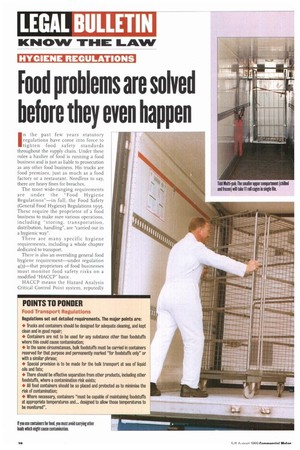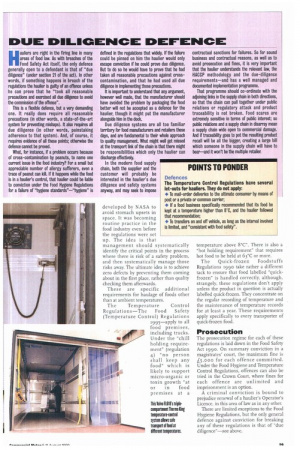Food problems are solved before they even happen
Page 30

Page 31

If you've noticed an error in this article please click here to report it so we can fix it.
In the past few years statutory regulations have come into force to tighten food safety standards throughout the supply chain. Under these rules a haulier of food is running a food business and is just as liable to prosecution as any other food business. His trucks are food premises, just as much as a food factory or a restaurant. Needless to say, there are heavy fines for breaches.
The most wide-ranging requirements are under the "Food Hygiene Regulations"—in full, the Food Safety (General Food Hygiene) Regulations 1995. These require the proprietor of a food business to make sure various operations, including "storing, transportation, distribution, handling", are "carried out in a hygienic way".
There are many specific hygiene requirements, including a whole chapter dedicated to transport.
There 'is also an overriding general food hygiene requirement—under regulation 4(3)—that proprietors of food businesses must monitor food safety risks on a modified "HACCP" basis.
HACCP means the Hazard Analysis Critical Control Point system, reputedly
developed by NASA to avoid stomach upsets in space. It was becoming routine practice in the food industry even before the regulations were set up. The idea is that management should systematically identify the critical points in the process where there is risk of a safety problem, and then systematically manage those risks away. The ultimate idea is to achieve zero defects by preventing them coming about in the first place, rather than quality checking them afterwards.
These are specific additional requirements for haulage of foods other than at ambient temperatures.
The Temperature Control Regulations—The Food Safety (Temperature Control) Regulations I995—apply to all food premises, including trucks. Under the "chill holding requirement" (regulation 4) "no person shall keep any food" which is likely to support micro-organic or toxin growth at or in food premises at a
temperature above 8°C". There is also a "hot holding requirement" that requires hot food to be held at 63°C or more.
The Quick-frozen Foods tuffs Regulations 1990 take rather a different tack to ensure that food labelled "quickfrozen" is handled correctly, although, strangely, these regulations don't apply unless the product in question is actually labelled quick-frozen. They concentrate on the regular recording of temperature and the maintenance of temperature records for at least a year. These requirements apply specifically to every transporter of quick-frozen food.
Prosecution
The prosecution regime for each of these regulations is laid down in the Food Safety Act 1990. On summary conviction in a magistrates' court, the maximum fine is L5,000 for each offence committed. Under the Food Hygiene and Temperature Control Regulations, offences can also be tried in the Crown Court, where fines for each offence are unlimited and imprisonment is an option.
A criminal conviction is bound to prejudice renewal of a haulier's Operator's Licence, in this area oilaw as in any other.
There are limited exceptions to the Food Hygiene Regulations, but the only general defence against conviction for breaking any of these regulations is that of "due diligence"—see above,








































































































